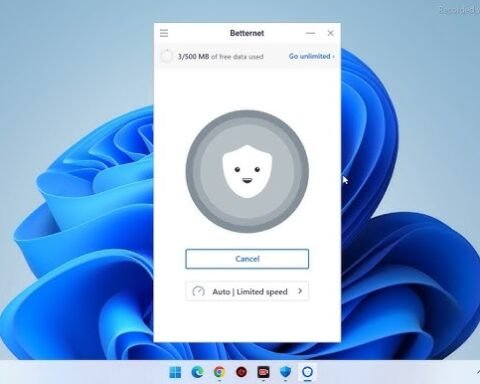AirVPN is one of those underground legends in the VPN world. It’s not promoted through flashy ads or influencer sponsorships, but it’s frequently recommended in security forums and privacy communities—for good reason. If you’re the type of person who inspects encryption standards or prefers open-source clients, AirVPN feels like it was built for you.
I’ve used AirVPN off and on since 2020, and what’s striking about it in 2025 is how consistent it has remained in prioritizing privacy, ethics, and transparency—even when the market is flooded with more commercialized alternatives. It may not be the most beginner-friendly, but it absolutely holds its ground as one of the best no-logs VPNs in 2025 for users who know what they’re doing.
Quick Summary: AirVPN at a Glance
What I Like
- True no-logs policy, run by privacy activists
- Based in Italy, with strong privacy laws (and openly critical of data surveillance)
- Fully open-source apps
- Excellent OpenVPN configuration options
- Tor over VPN support, port forwarding, dynamic DNS
- Transparent server stats and uptime metrics
What Could Be Better
- No WireGuard support (at least as of mid-2025)
- Apps feel clunky and overly technical
- Not great for streaming or mobile-first users
- Speeds are good but not top-tier
- Website and client UI can be overwhelming
AirVPN is ideal if you’re privacy-focused, tech-savvy, and tired of the VPN mainstream. But it’s probably not the right choice if you just want to unblock Netflix and browse on your phone.
Privacy & Security: Laser-Focused and Transparent
AirVPN is built around a radical commitment to privacy, which is evident in every aspect of the service. It’s operated by a small team of lawyers, activists, and technologists who have been deeply involved in defending digital rights since 2010.
No-Logs Policy
- Zero traffic logs, no DNS requests, no connection timestamps
- Your account is only linked to a username (email optional)
- Bitcoin and privacy coins accepted
- Explicitly opposes surveillance laws—and regularly updates its stance on EU digital policy
This is one of the most ethically grounded no-logs VPNs on the market. Unlike many mainstream providers that quietly log metadata, AirVPN makes a clear stand against all forms of data retention.
Security Protocols
- Uses OpenVPN exclusively, configured via its open-source “Eddie” client
- Supports SSL and SSH tunneling for obfuscation
- Perfect Forward Secrecy, strong AES-256-GCM encryption
- Kill switch, DNS leak protection, and IPv6 support built-in
While it doesn’t yet support WireGuard, the OpenVPN implementation here is flawless, with more customization than you’ll find in any major VPN app.
Features & Functionality: Built for Power Users
AirVPN is a power user’s dream. It doesn’t try to be slick or simplified—it gives you full control over how your VPN behaves. From port forwarding to dynamic DNS and VPN over Tor, it provides a robust toolkit for users with specific privacy or networking needs.
Standout Features
- Tor over VPN: Route traffic through the Tor network after the VPN tunnel
- SSL and SSH tunneling: Helps evade deep packet inspection
- Custom port forwarding: Great for P2P, self-hosting, or remote access
- Real-time server transparency: Publicly visible server loads, uptime, and stats
- Dynamic DNS service: Allows you to access your device remotely with a persistent hostname
AirVPN gives you fine-grained control over how your VPN connects and routes traffic—something almost no other provider offers in 2025.
User Experience: Functional, But Not Polished
Let’s be honest: AirVPN’s design is… functional. If you’re used to polished interfaces like NordVPN or ExpressVPN, the “Eddie” client feels clunky and outdated. But it’s also extremely powerful under the hood.
Desktop Clients
- Eddie (AirVPN’s client) is available for Windows, macOS, Linux
- Offers advanced routing rules, tunneling options, and interface-level protection
- Stats-rich interface with visibility into everything from handshakes to DNS requests
Mobile Access
- No native mobile apps
- Manual setup required via OpenVPN for Android/iOS
- Some guides exist, but not beginner-friendly
The lack of mobile polish limits its usability for on-the-go browsing, but desktop users get one of the most configurable clients available—especially if you’re using Linux or BSD.
Pricing & Payment Options: Flexible and Privacy-Friendly
AirVPN sticks to a simple and transparent pricing model. No aggressive upsells, no fake “limited time” countdowns—just honest pricing with full feature access across all plans.
Plans and Pricing
- 3 Days – €2.00 (great for quick testing)
- 1 Month – €7.00
- 3 Months – €15.00 (€5.00/month)
- 6 Months – €29.00 (€4.83/month)
- 1 Year – €49.00 (€4.08/month)
- 2 Years – €79.00 (€3.29/month)
- 3 Years – €99.00 (€2.75/month)
No matter what you choose, you get the same feature set—multi-hop, port forwarding, full protocol support, etc. That’s something even many of the best VPNs of 2025 don’t offer.
Payment Methods
- Credit cards
- PayPal
- Bitcoin, Ethereum, and Monero
- Even cash via postal mail
AirVPN’s payment system is designed with anonymity in mind. I especially like that you can sign up without an email address, making this a top-tier choice for those with strict OPSEC needs.
Streaming, Torrenting & Censorship: Power for Some, Pain for Others
AirVPN wasn’t built for entertainment, and it doesn’t pretend to be. That said, its torrenting and censorship evasion capabilities are strong—especially if you know how to configure things properly.
Streaming
- Netflix, Hulu, BBC iPlayer: Mostly blocked
- No smart DNS or dedicated streaming servers
- Occasionally works with less-known regional platforms, but not reliable
In short: don’t use AirVPN if streaming is a major priority. ExpressVPN or Proton VPN are better suited for that in 2025.
Torrenting
- Fully supported with no restrictions on P2P traffic
- Port forwarding built in (huge for seeders and private trackers)
- Transparent bandwidth policies and real-time usage stats
For torrenting, AirVPN is among the most secure and customizable VPNs out there. The port forwarding alone puts it a step ahead of many mainstream providers.
Bypassing Censorship
- SSL/SSH tunneling and Tor over VPN work well in restrictive countries
- Doesn’t advertise “stealth” modes, but advanced configs get the job done
- Actively maintained community guides for use in China, UAE, and Iran
It’s not plug-and-play like Windscribe or Surfshark, but it works reliably once set up properly. For tech-savvy journalists or users under surveillance, AirVPN remains a solid pick.
Who AirVPN Is Best For
AirVPN is not for beginners, and it doesn’t try to be. But for users who value freedom, transparency, and fine-grained control, it’s a breath of fresh air.
Best For:
- Developers, sysadmins, and Linux users
- Journalists, activists, and whistleblowers
- Privacy experts and crypto enthusiasts
- People who prefer OpenVPN over WireGuard
- Those who want full access to Tor over VPN, port forwarding, and multi-hop routing
Not Ideal For:
- Streaming or casual Netflix binge-watchers
- Users who need slick mobile apps or live chat support
- Beginners who want a “just click and go” VPN
- Anyone needing WireGuard support (as of now)
AirVPN knows its audience. If you’re among the privacy-conscious, you’ll likely appreciate the control—even if the learning curve is a bit steeper.
Transparency & Ethics: Activist-Run, Community-Focused
One of the most impressive things about AirVPN is its open stance on internet freedom and transparency. Unlike many providers who hide behind vague policies and outsourced operations, AirVPN is proud of its roots in digital rights activism.
Logging & Data Practices
- True no-logs VPN: no IP logs, traffic logs, timestamps, or metadata
- Open about its legal obligations in Italy (which favor user privacy)
- Publicly publishes server status, uptime, and load data in real time
- Actively contributes to net neutrality, encryption rights, and anti-surveillance discourse
Community Engagement
- Maintains a thriving user forum with direct developer interaction
- Community-developed guides for censorship circumvention, Linux setups, and Tor usage
- Supports open-source projects and invites community audits
Unlike most VPNs, AirVPN talks openly about political and technical threats to privacy. It’s one of the few providers I’d trust with real-world anonymity needs.
Final Verdict: For Power Users Who Know What They Want
AirVPN isn’t trying to be flashy—and in 2025, that’s part of its appeal. While most VPNs are leaning into gamified dashboards and streaming unlocks, AirVPN stays grounded in technical excellence and principled privacy.
If you’re a journalist, security researcher, developer, or privacy maximalist, AirVPN provides a toolbox full of advanced features, like port forwarding, Tor integration, and protocol-level customizations—things most VPNs bury or avoid entirely.
However, it’s not ideal for beginners. There’s a learning curve, especially with mobile setup and protocol tunneling. But for those who know what they’re doing—or are willing to learn—it remains one of the best no-logs VPNs of 2025.
Final Score: 8.5/10 — A privacy-focused VPN that trades polish for raw power. If you care more about encryption integrity and open governance than streaming or simplicity, AirVPN is one of the few VPNs that actually walks the talk.
Best Alternatives to AirVPN
If you like AirVPN’s ethical approach but need something more streamlined or beginner-friendly, here are three top alternatives in 2025:
Mullvad VPN
- Anonymous sign-up (no email required)
- WireGuard support
- Flat-rate pricing (€5/month)
- Easier to use than AirVPN, while remaining privacy-first
- Excellent choice for Linux users and privacy newbies
IVPN
- Accepts Monero and anonymous accounts
- Gibraltar-based with transparent ethics
- Offers App Lockdown and AntiTracker features
- Simpler UI than AirVPN, still very privacy-focused
- Supports both OpenVPN and WireGuard
Proton VPN
- Swiss-based and fully audited
- Sleek, user-friendly apps
- “Secure Core” multi-hop servers
- Great for journalists who need both usability and privacy
- Built-in Tor support and integrated kill switch
Each of these VPNs maintains a strong commitment to no-logs policies, privacy protections, and open governance, while catering to slightly different levels of technical comfort.
FAQs: AirVPN 2025
Is AirVPN a true no-logs VPN?
Yes. AirVPN stores no logs whatsoever—no IP addresses, session data, DNS requests, or timestamps. It is one of the few providers that genuinely practices what it preaches.
Does AirVPN support WireGuard?
As of mid-2025, no native WireGuard support is available. AirVPN sticks to OpenVPN only, prioritizing configurability and maturity over newer protocols.
Is AirVPN good for streaming?
Not really. Streaming platforms like Netflix, Hulu, and BBC iPlayer tend to block AirVPN IPs. It’s not designed for entertainment use.
How do I use AirVPN on mobile?
There are no official mobile apps. You’ll need to manually configure OpenVPN or similar apps using .ovpn files. Guides are available, but the setup can be technical.
Can AirVPN bypass censorship?
Yes—with proper configuration. AirVPN supports SSL/SSH tunneling and Tor over VPN, which can bypass DPI and firewall restrictions in countries like China or Iran.
Is it good for torrenting?
Absolutely. It supports unrestricted P2P, offers port forwarding, and doesn’t throttle traffic. It’s one of the most torrent-friendly VPNs in 2025.








